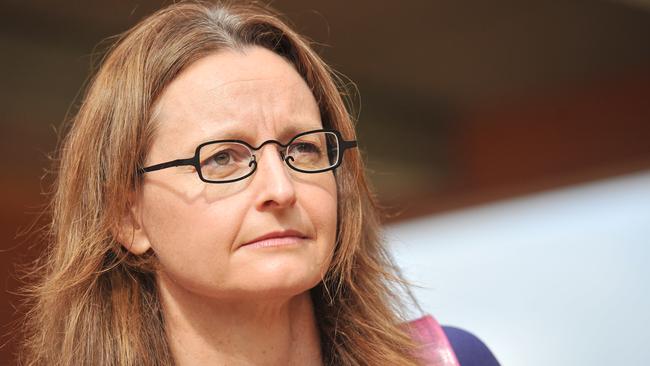NDIS payments slashed for dying 15-year-old Territory girl
The NDIS halved the funding for a blind wheelchair-bound 15-year-old with a terminal illness. Read about her carer’s anguish over the teen’s final days.
Alice Springs
Don't miss out on the headlines from Alice Springs. Followed categories will be added to My News.
A Territory foster carer has described a “monster of a system” that stripped a dying 15-year-old of her disability support funding months before she passed away.
Coroner Elisabeth Armitage has released her findings surrounding the death in care of a Central Australian girl, known for cultural reasons as Kumanjayi Holmes.
Ms Armitage found the National Disability Insurance Scheme halved the funding for the blind wheelchair-bound teenager meaning her funding ran out five-weeks before she passed away on October 31, 2021.
The scathing report comes as the Disability Royal Commission continues to hear evidence of neglect, abuse and exploitation of people with disability.
“Kumanjayi was an extremely vulnerable recipient of the NDIS for whom the scheme should have operated better,” Ms Armitage said.
Ms Armitage said Kumanjayi’s health issues started when she was just six years old, when her mother Roxanne Morton noticed her eyesight was deteriorating.

Her little girl started suffering from seizures and rapidly losing her sight, but it would take another six years for a full assessment of her condition.
At 12, Kumanjayi was diagnosed with Batten disease, a degenerative condition that gave her a life expectancy of just 15 to 30 years.
The gene mutation rapidly robbed the young girl of her vision, her ability to walk, her cognitive abilities, movement and speech, while causing seizures, learning and behavioural problems and Parkinsonism.
Kumanjayi was eight when she was initially referred to the National Disability Insurance Scheme in 2014.
The coroner heard that despite repeated inquiries it took 16 months for her plan to be approved, and even then it was unclear to Territory Families if she had been formally accepted as an NDIS client.
Ms Armitage found during that time her mother repeatedly flagged that she needed help, while there were seven harm notifications sent to Territory Families about Kumanjayi’s care.
The coroner said while trying to care for her disabled child, Kumanjayi’s mother was also struggling to protect herself from violence and was twice hospitalised following serious domestic violence assaults.

With her mother’s consent, the 10-year-old was placed in the care of Territory Families in July 2016 with a Tennant Creek-based foster carer and disability worker Angela Teasdale.
A month after going into foster care, the NDIS finally provided a copy of Kumanjayi’s case plan to Territory Families.
“Her progressive disease meant that her support needs increased quite rapidly and her NDIS plan required frequent review,” Ms Armitage said.
“However, despite advocacy by both Ms Teasdale and TFHC, the reviews did not occur in a timely manner and her supports did not meet her increasing level of need.”
In 2018 an Administrative Appeals Tribunal sided with Territory Families that her NDIS plan was “insufficient”.
The NDIS agreed to deliver $360,000 every six months from 2018 to 2020 to support Kumanjayi.
However, two years after she was formally diagnosed with the terminal illness, the NDIS slashed Kumanjayi’s funding by more than half to an annual payment of just $246,874.
Ms Armitage said the decision was “inexplicable”, with the now wheelchair-bound, blind 15-year-old suffering from dementia, alzheimer's shake and needing help to eat and use the bathroom.

A second appeal was lodged with a hearing set for November 2021, four months after her funding was due to run out.
Before the hearing could even take place, Kumanjayi passed away at the Palliative Care Ward of Alice Springs Hospital on October 31, 2021 — five months after her 15th birthday.
Ms Teasdale described her anguish in the final days of her foster child’s life, while battling “a monster of a system”.
“(The NDIS) was disgracefully and inhumanely negating any level of impact of disability that she had,” she told the coroner.
In her concluding remarks, Ms Armitage was critical of the “stalemate” between Territory Families and the NDIS over Kumanjayi’s care funding.
Territory Families Central Australia Region executive director Martina O’Brien told the coroner that as a response to Kumanjayi’s case monthly meetings were now held between the department’s specialist disability team and the National Disability Insurance Agency.
Ms O’Brien said this would reduce the need for appeals and the risk of NDIS plans running out of funding.

She said nationally the NDIA was trying to streamline communications between the federal body and various child protection agencies.
A NDIA spokesman said it was also reviewing its practices “to ensure this does not happen again”.
“We are going to look at what we could have done in light of the coroner’s judgment and see what else is required in future,” he said.
In handing down her findings on March 31, Ms Armitage made no recommendations given the changes already underway.
Ms Armitage extended her sympathy with the family and foster carer of Kumanjayi.
“It is clear that Ms Teasdale ensured that Kumanjayi was supported and loved by those who cared for her,” she said.
“(Ms Teasdale was) determined to fill Kumanjayi’s life with as much experience and fun as possible.”





